United Nations Human Rights Council, Press Release on Freedom of Expression
October 2009 – New York City
As part of the 2 October 2009 Press Release under the title “Human Rights Council Adopts Six Resolutions and One Decision on Discrimination against Women and Freedom of Expression, among Others,” under the Agenda Item “On the Promotion and Protection of All Human Rights,” the United Nations Human Rights Council announced that, in a resolution on freedom of opinion and expression (A/HRC/12/L.14/Rev.1) introduced by Egypt and the United States, it adopted without a vote the reaffirmation of the rights contained in the International Covenant on Civil and Political Rights. The UNHRC further “expresses its concern that incidents of racial and religious intolerance, discrimination and related violence, as well as of negative racial and religious stereotyping continue to rise around the world; calls on all parties to armed conflict to respect international humanitarian law; recognizes the moral and social responsibilities of the media and the importance that the media’s own elaboration of voluntary codes of conduct can play; invites the Special Rapporteur on the protection and promotion of the right to freedom of opinion and expression, to carry out his activities in accordance with its resolution 7/36 and all relevant Council resolutions and decisions; requests the Secretary-General to provide the assistance necessary to the Special Rapporteur to fulfil his mandate effectively; requests the Special Rapporteur to submit an annual report to the Council and the General Assembly on the activities relating to his mandate; and decides to continue its consideration of the issue of the right to freedom of opinion and expression in accordance with its programme of work.”
European Court of Human Rights Decides Bayatyan v. Armenia
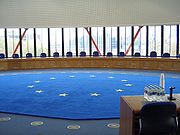
November 2009 – Strasbourg
In a chamber judgment of 6 October 2009, the European Court of Human Rights issued a controversial decision on conscientious objection in the case Bayatyan v. Armenia. Commenting on the decision in a 19 November 2009 report of Forum 18 News Service, Derek Brett of Conscience and Peace Tax International asserts that the Court, “apparently unaware of the recent parallel jurisprudence under the International Covenant on Civil and Political Rights, found no violation of the freedom of thought, conscience and religion in the imprisonment of a Jehovah’s Witness for his refusal on grounds of conscientious objection to perform military service, or the subsequent increase in the sentence, which had been partly justified by his reasons for refusal. Brett argues that it is vital that the Grand Chamber of the ECHR agrees to hear the appeal in the Bayatyan case, as it alone can overturn the precedent which this will otherwise set for future ECHR cases.”
* See full Brett article and link to the judgment, below. *
Professors Cole Durham and Tore Lindholm Assist with Human Rights Advocates Training Course near Jarkarta, Indonesia
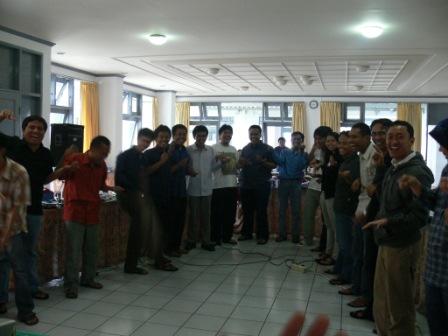
August 2009 – Indonesia
During 9-15 August 2009, ICLRS had the opportunity of joining with two Indonesian organizations, the Indonesian Legal Aid Foundation and the TIFA Foundation, and the Oslo Coalition for Freedom of Religion or Belief in providing a Training Course for Lawyers on Freedom of Religion or Belief that was held near Jakarta, Indonesia. ICLRS Director Cole Durham served as one of the trainers along with ICLRS Board Member Tore Lindholm, who attended on behalf of the Oslo Coalition. Professors Durham and Lindholm joined Indonesian experts Adam Pantouw, Renata Arianingtyas, Zainal Abidin, and Asfinawati in helping with the development of Indonesia-focused training materials and leading the actual training sessions. The Training Course attracted a remarkable group of 28 young Indonesian lawyers from 14 provinces who have already had significant experience defending religious communities that have suffered discrimination and persecution.
Over the last five years, Indonesia has experienced an increasing number of religious freedom and religious intolerance cases across the country. The Wahid Institute (www.wahidinstitute.org) reported that the number reached more than five cases monthly, with seven cases brought to court. Through the Belief Monitoring Body (Bakorpakem) under the attorney general’s office and Law No. 1/PnPs/1965, the government of Indonesia recognizes six religions and has the authority to monitor any beliefs existant in society. The body can recommend that the government of Indonesia dissolve belief groups by providing instructional religious teachings to them and by legally dissolving an association. The most controversial case was Ahmadiyya, which was followed by attacks on Ahmadiyya communities across the country by the other Islamic radical groups. In view of this situation, it is important to train lawyers to represent and defend victims of religious intolerance cases in any stages as well as to educate victims as to their constitutional rights to protect their freedom of religion.
ICLRS Co-sponsors “Religious Autonomy” Conference in Budapest

May 2009 – Budapest
In conjunction with Central European University, the International Center for Law and Religion Studies (ICLRS) sponsored a conference entitled “Religious Autonomy” held 29-30 May 2009 in Budapest, Hungary. Conference topics focused on theological and jurisprudential perspectives on religious autonomy. The assembled experts also discussed autonomy issues that are currently under consideration by the European Court of Human Rights, specifically, religious employment and the resolution of religious disputes. Finally, the participants identified and discussed emerging religious autonomy issues and trends for the future.
European Court of Human Rights Issues Decision in Lang v. Austria

March 2009 – Strasbourg
In a decision issued March 19, 2009, the European Court of Human Rights held that, while countries are not required to offer exemption from military service for certain members of religious groups, if it does offer such exemptions, they must apply in a way that does not discriminate between different types of religious organizations. In Lang v. Austria, the court held that an Austrian statute granting legal exemption from military service to members of a recognized religious society, but denying the exemption to members of a recognized religious communities, violated Article 14 of the European Convention for the Protection of Human Rights and Fundamental Freedoms (the Convention) which says that the principles of the Convention be applied in a non-discriminatory manner. Article 14 cannot exist independently, so the petitioner also invoked the protection of manifestations of religious belief protected under Article 9 of the Convention. In this case, the Upper Austrian Military Authority refused to grant Lang, a preacher and elder for the Jehovah’s Witnesses, the benefit of the religious exemption to military service on the grounds that the Jehovah’s Witnesses were recognized only as a religious community, not a religious society. Austria argued that since the government was not required to grant any type of religious exemption under Article 9, not granting the exemption to members of religious communities could not violate the Convention. The Court cited Religionsgemeinschaft der Zeugen Jehovas and Others v. Austria (no. 40825/98, 31 July 2008, in which they determined that if registering as a religious society affords special treatment or additional benefits, the criteria to achieve that status must be applied in a non-discriminatory manner. Any difference in treatment must be based on a “’objective and reasonable justification.’” The court in this case concluded that the State demonstrated no objective and reasonable justification for basing the military exemption on whether the religious group was registered as a society or a community. Therefore, it held, the exemption violated Article 14 of the Convention, applied in conjunction with Article 9, but found no direct violation of Article 9.
President of Kazakhstan will not challenge Finding that Draft Law is Unconstitutional

March 2009 – Kazakhstan
Kazakhstan President Nursultan Nazarbaev will not be challenging the ruling of the country’s Constitutional Court that a draft religion law was unconstitutional, the Court said. The Court declared the restrictive draft law, titled, “Law on Amendments and Additions to Several Legislative Acts on Questions of Freedom of Conscience and Religious Associations,” unconstitutional in a decision announced on February 11, 2009. The president then had up to a month to challenge the decision. However, the Constitutional Court announced on March 11, 2009, that it was informed by the presidential administration this will not happen. Kazakhstan citizens, however, remain wary that new laws imposing similar restrictions will be pushed through at some time in the future. “This is not the end of the attempt to adopt such a law,” Yevgeny Zhovtis, head of the Almaty-based Kazakhstan International Bureau for Human Rights and Rule of Law, said. “I think they will try again.”
Afghan Court Upholds 20-Year Sentence for Two Convicted of Translating Quran Without Original Arabic Text
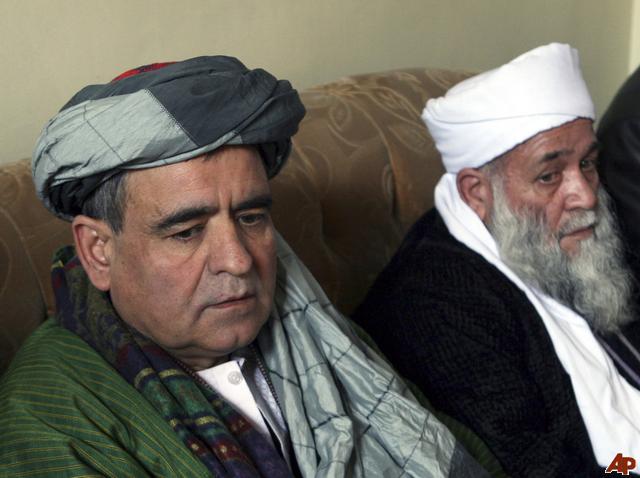
February 2009 – Kabul
On 15 February 2009, an Afghan appeals court upheld 20-year sentences for two men who helped to publish an Afghan translation of the Quran without including the original Arabic text. In 2007, Ahmed Ghaws Zalmai, a former spokesman for the Attorney General, helped to print 1,000 copies of the translation, and Qari Mushtaq Ahmed, a cleric, signed a letter endorsing the translation. Several clerics condemned the book because of the omission of the original Arabic text, claiming it was a replacement, rather than a translation, of the Quran, and the Afghan Islamic counsel issued an edict condemning the book. While there is no law in Afghanistan prohibiting the translation or printing of the Quran without the accompanying Arabic text, courts are permitted to use Islamic Shariah law when there is no applicable statute. Before the 15 February decision, the Institute on Religion and Public Policy urged Afghan authorities to drop charges against the two men. “Under the universal right of freedom of religious expression and even the Constitution of Afghanistan, these men violated no law in translating the Quran as they did,” said Institute President Joseph K. Grieboski. “Such disputes on religious practice or theology should remain within the confines of the faith, without the state or its judiciary becoming involved or handing down verdicts.”
The International Conference on the Constitution Making of Nepal, Budhanilkantha, Kathmandu
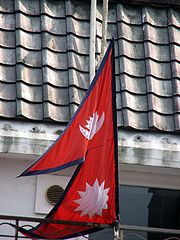
February 2009 – Kathmandu
The “International Conference on the Constitution Making of Nepal” was held 13-15 February 2009, in Budhanilkantha, Kathmandu, Nepal. This conference was convened to discuss the many issues facing Nepal as it seeks to write and adopt a new constitution. Experts from Nepal and other countries met to discuss the principles of federalism, the judiciary, human rights and secularism, and human rights and gender.
Speakers at the Inaugural Session on 13 February included Former Prime Minister Girija Prasad Koirala; C.P. Mainali, General Secretary, Nepal Communist Party (Marxist-Leninist) and member of the Constituent Assembly; Khim Lal Devkota, Member, United Nepal Communist Party (Maoist) and Member of the Constituent Assembly and of its Constitutional Drafting Committee; and Brijesh Kumar Gupta, Tarai Maesh Loktantric Party. These leaders of major political parties discussed major positions of their respective parties on the desired contents of the constitution. Professor Kanak Bikram Thapa, former Dean of the Faculty of Law of Tribhuvan University, gave introductory remarks. Sujata Koirala, Former Minister, Central Committee Member of Nepali Congress and Head of Foreign Department of the Nepali Congress Party chaired the session.
Foreign participants at the conference included Professor Tahir Mahmood, Member of the Law Commission of India; and Professor W. Cole Durham, Jr., J. Reuben Clark Law School, Brigham Young University, USA.
Religious Freedom in Schools: Booklet available to teach Students, Parents, and Educators the State of the Law Regarding Students’ Religious Liberty in Schools
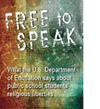
January 2009
Two important dates in January recognize the right of religious freedom: January 16th is national Religious Freedom Day and January 11th is Religious Freedom Sunday, a nationwide initiative established by Gateways to Better Education to increase awareness of Religious Freedom Day. January 16th is the anniversary of the passage of the Virginia Statute of Religious Freedom, drafted by Thomas Jefferson and intended to protect the rights of all people to express, or to not express, their religious beliefs free of discrimination based on those beliefs. Every year, the President of the United States of America issues a statement discussing Religious Freedom Day and calls on all Americans to “reflect on the great blessing of religious liberty, endeavor to preserve this freedom for future generations, and commemorate this day with appropriate events and activities in their sch”ols, places of worship, neighborhoods, and homes” (“Religious Freedom Day, 2007” press release, available online at http://www.whitehouse.gov/news/releases/2007/01/20070111-2.html). The Alliance Defense Fund, in an electronic newsletter, asserts that religious freedom in schools is a continuing issue: “In too many instances, public school teachers tell Christian students they cannot include their faith in their homework assignments or classroom discussions.” ADF then goes on to say that “the U.S. Department of Education has issued guidelines explaining students’ religious liberties. Students can pray, read their Bibles, and talk about their faith at school during school hours. They can also express their faith in their class work and homework.” January 11th is Religious Freedom Sunday, a nationwide initiative created by Gateways to Better Education with the purpose of creating more awareness of Religious Freedom Day. Religious Freedom Sunday “calls churches to ‘proclaim liberty throughout the land’ (Lev.25:10) by honoring the educators within their congregations and informing the students, parents, and educators in the church about students’ religious liberty in their public schools.” To help churches do this, and to highlight the legal assistance that ADF can provide, Gateways published “Free to Speak,” a pocket-sized summary of the U.S. Department of Education’s guidelines on students’ religious liberties. January 11th, Religious Freedom Sunday, is a day for churches across the nation to distribute “Freedom to Speak” to their congregations. For more information about how to order “Free to Speak,” visit www.gtbe.org/store or call (800) 929-1163. *This information was taken from an electronic newsletter from the Alliance Defense Fund. More information is also available on the Gateways to Better Education website at http://www.gtbe.org/news/index.php/1/65/203.html.
European Court of Human Rights Decides Lautsi v. Italy
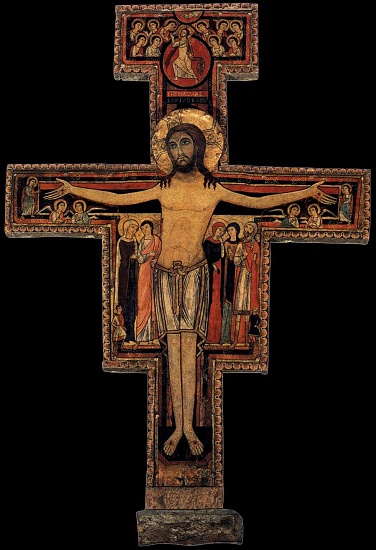
November 2009 – Strasbourg
On 3 November 2009 the European Court of Human Rights issued its decision in the case of Lautsi v. Italy, ruling that the display of crucifixes in Italian public schools violates Article 2 of Protocol 1 (right to education) and Article 9 (freedom of thought, conscience and religion) of the European Convention on Human Rights. Rejecting the assertions of the Italian government that the crucifix is a national symbol with cultural and historical significance expressing identity, tolerance, and secularism, the court ordered the government to pay a fine of €5000 ($7,300) to applicant Soile Lautsi, mother of two children whom she claimed were affronted by the display of crucifixes in the public school they attended. Church representatives and government officials were angered and confused by the “extraordinarily wide” ruling, which could have the effect of forcing review of displays of religious symbols in government-run schools across Europe. For more information, please consult the links below.